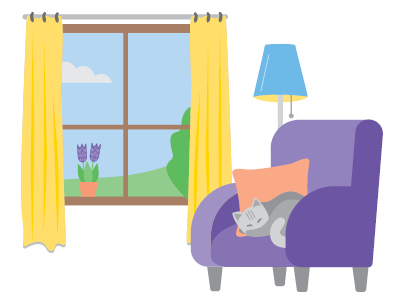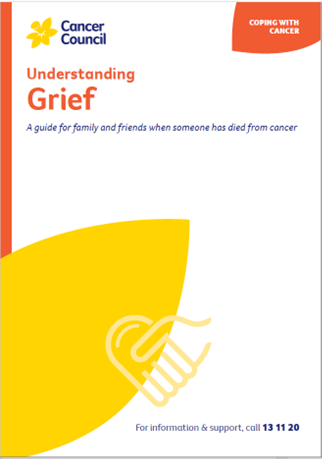- Home
- Cancer Information
- Advanced cancer
- Understanding grief
- What is grief?
What is grief?
In this section we talk about what grief is, how family and friends may grieve, and the types of grief. Everyone’s experience of grief is different, so this is a general guide only.
Learn more about how:
- Everyone grieves differently
- What can affect the way you grieve?
- How family and friends might grieve
- Bereavement, grief and mourning
- Types of grief
- Podcast: Coping with Grief

Grief is a natural response to any loss. The process of grieving is one of adjusting to the loss. There is no set time frame or pattern for learning to live without someone. Grief may never go away completely. With support and understanding, you will find a way to cope.
Everyone grieves differently
Everyone responds to the death of someone close to them in their own way and in their own time. This information focuses on grief after a death from cancer, but much of the information applies to any type of loss, such as the loss of a relationship, a job, a pet, your good health, your way of life or treasured possessions.
Grief can be a confusing and overwhelming experience. It can involve a range of feelings and they can affect you in different ways. You may find it helpful to learn more about common grief reactions and ways of coping.
What can affect the way you grieve?
The way you grieve can be affected by a number of things, including:
- how old you are and the age of the person who has died
- your gender
- your personality
- the relationship you had with the person who died
- the support you have from others
- how much your life will change as a result of the death
- your cultural background, including any rituals or customs associated with death
- past experiences of loss and death
- how the person died – whether their death was expected, unexpected or traumatic
- your spiritual view of life and death
- other stresses you have in your life (e.g. financial, housing)
- your past and present mental health and wellbeing.
How you feel and react to grief may be influenced by the person’s cancer experience and the way the disease progressed. You may find that you focus on memories of the physical changes and deterioration experienced by the person who died. Or you may wonder if the person could have received different treatment or care.
How family and friends might grieve
It is common for family members and friends grieving for the same person to deal with their grief in different ways and for different lengths of time. It is important to respect how others are grieving.
People may behave differently at different times – and their behaviour may be unpredictable. Some people express their grief through crying and talking, creative activities, outbursts of anger or keeping busy.
Other people prefer to be quiet, spend time alone or join a support group. If someone’s way of grieving is uncomfortable for you, try to avoid judging them and accept that everyone is different. Let them grieve in a way that feels right for them.
This can be an opportunity to support and comfort each other and understand other ways of grieving. For more on this see How to help someone who is grieving. It also includes information on helping children.
Bereavement, grief and mourning
The terms bereavement and mourning are closely related to grief, but they have slightly different meanings:
- Bereavement – usually refers to the period of sadness after a death.
- Grief – is the process of responding to the loss and it can affect all parts of your life.
- Mourning – is how you show sorrow for someone’s death, which may be influenced by cultural customs and rituals.
Podcast: Coping with Grief
Listen to more episodes from our podcast for people affected by cancer
A/Prof Lisa Beatty, Associate Professor in Clinical Psychology and Consulting Clinical Psychologist, Flinders University Institute of Mental Health and Wellbeing, SA; Sandra Anderson, Consumer; Dr Alexandra Clinch, Palliative Medicine Specialist and Deputy Director, Palliative Care, Peter MacCallum Cancer Centre and Royal Melbourne Hospital, VIC; Christopher Hall, Chief Executive Officer, Grief Australia; Nathan MacArthur, Specialist Grief Counsellor and Accredited Mental Health Social Worker, Sydney Grief Counselling Services, NSW; Linda Magann, Clinical Nurse Consultant – Palliative Care, St George Hospital, NSW; Palliative Care Australia; Richard Upton, Consumer; Lesley Woods, 13 11 20 Consultant, Cancer Council WA.
View the Cancer Council NSW editorial policy.
View all publications or call 13 11 20 for free printed copies.
Need to talk?
Support services
Caring for someone with cancer
Speak to a health professional or to someone who has been there, or find a support group or forum
Cancer Council Online Community
A community forum – a safe place to share stories, get tips and connect with people who understand
Cancer information
Emotions and cancer
Learn about the range of emotions you may experience if you are affected by cancer
End of life
This information may help you better cope with end of life, or support someone who may be dying with cancer
